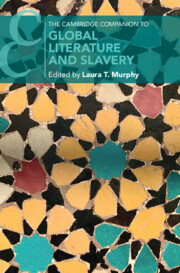Book contents
- The Cambridge Companion to Global Literature and Slavery
- The Cambridge Companion to Global Literature and Slavery
- Copyright page
- Contents
- Contributors
- Acknowledgments
- Chronology
- Introduction
- Part I Contexts and Contestation
- Part II Forms and Figures
- Part III Legacies and Afterlives
- Part IV Metaphors and Migrations
- Chapter 12 Itineraries of Arabic across Oceans and Continents
- Chapter 13 Apartheid’s Ghosts
- Chapter 14 African Boat Narratives, Disposable Bodies, and the New Native Survivor
- Chapter 15 Mediterranean Afterlives of Slavery
- Further Reading
- Index
- Cambridge Companions To …
Chapter 14 - African Boat Narratives, Disposable Bodies, and the New Native Survivor
from Part IV - Metaphors and Migrations
Published online by Cambridge University Press: 15 December 2022
- The Cambridge Companion to Global Literature and Slavery
- The Cambridge Companion to Global Literature and Slavery
- Copyright page
- Contents
- Contributors
- Acknowledgments
- Chronology
- Introduction
- Part I Contexts and Contestation
- Part II Forms and Figures
- Part III Legacies and Afterlives
- Part IV Metaphors and Migrations
- Chapter 12 Itineraries of Arabic across Oceans and Continents
- Chapter 13 Apartheid’s Ghosts
- Chapter 14 African Boat Narratives, Disposable Bodies, and the New Native Survivor
- Chapter 15 Mediterranean Afterlives of Slavery
- Further Reading
- Index
- Cambridge Companions To …
Summary
This chapter reconsiders chattel slavery’s legacy in contemporary stories of migration, highlighting the inadequacies of reading these works through memories of the Middle passage alone, while analyzing the insidious new forms of enslavement that African boat narratives expose. When read through the prescient work of Frantz Fanon, these stories present us with nothing less than revolutionaries of the crossing; those whose resounding “yes to life,” in the words of Frantz Fanon, is a deafening rejection of European anti-blackness, challenging border logic and the political machinations of inhospitality for a world in crisis. Migration, especially in today’s climate crisis, is above all else a human impulse that challenges the logic of inequality that slavery and colonialism have cast upon black lives, offering up movement as the dynamic imperative of life today.
Keywords
- Type
- Chapter
- Information
- The Cambridge Companion to Global Literature and Slavery , pp. 235 - 250Publisher: Cambridge University PressPrint publication year: 2022

